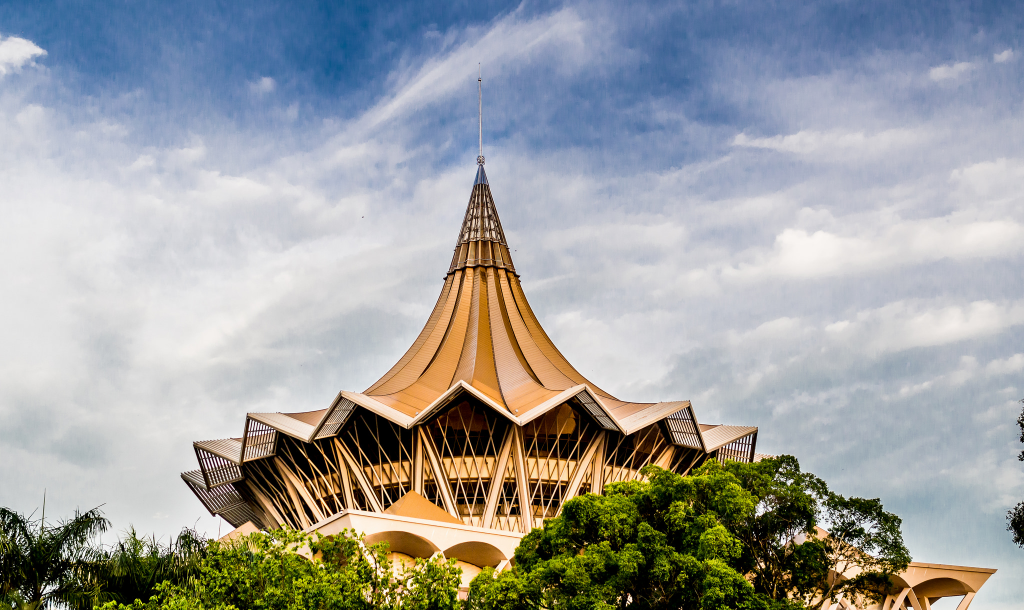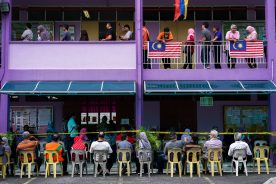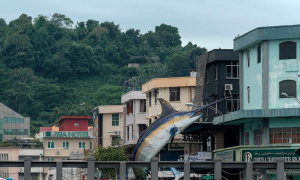An important political event occurred in Kuching last Saturday, but you would not know it if you were living outside Sarawak. The Malaysian media does not generally cover Sarawak (or Sabah) well, part of the long-established pattern of neglect over everything that is related to the Malaysian Borneo states.
It was the official launch of the Gabungan Parti Sarawak (GPS/Coalition of Sarawak Parties), the rebranding of the Sarawak Barisan Nasional (SBN). When Barisan Nasional (BN, led by former prime minister Najib Razak) lost power on 9 May last year, one of the first to bolt from the coalition was its Sarawak ally. SBN had no loyalties to UMNO, or for that matter, the federal BN. The strongman rule in Sarawak and the sense of “being different” from the rest of the federation was so strong that UMNO was never able to establish a branch in Sarawak. There was no UMNO presence in Sarawak at last year’s historic elections (GE14), even after six decades of dominating federal power.
Strongman politics
SBN consists of four parties: Pesaka Bumiputera Bersatu (PBB), Sarawak United Peoples Party (SUPP), Progressive Democratic Party (PDP), and Parti Rakyat Sarawak (PRS). They have enjoyed uninterrupted power since 1970, or half a century. Although all parties claim to be multiracial, it’s widely understood that PBB represents the Muslim community, SUPP the Chinese, while PDP and PRS the non-Muslim indigenous. Nevertheless, there are also significant pockets of indigenous members in PBB and SUPP.
If there’s one unmistakable feature of SBN, it is strongman politics. From 1970 until 2014, the chief minister of Sarawak came from a single Melanau-Muslim family, a period of 44 years. Rahman Yakub ruled from 1970 to 1981, succeeded by his nephew, Taib Mahmud, from 1981 to 2014. Their stranglehold on Sarawak politics has led to the chief minister’s family being one of the wealthiest in the region (not just Malaysia). Nothing exemplifies the raw power better than the fact that once Taib decided to “step down” as chief minister, he was immediately appointed as Sarawak’s governor.
His family footprint can be found in every major infrastructure and commercial project in Sarawak despite his supposedly ceremonial post as Governor. His family holdings are calculated in US billions, not in Ringgit. The family’s hold on the Sarawak economy is probably more extensive than the level of Suharto’s family control over the Indonesian economy in the 1980s.
GPS & state nationalism
It’s this context that is driving SBN to rebrand into GPS. They needed to walk away from Najib’s BN (associated with kleptocracy) and Taib’s BN (probably even bigger kleptocracy). With state elections looming next year (Sarawak is the only state to hold its elections separately from federal polls), GPS is trying to desperately recast itself as a State Nationalist party.
This unique situation has to do with historical grievances. GPS claims that the Malaysia Agreement 1963 (MA63) promised a high degree of state autonomy. These were “taken away” during the rule of the UMNO-dominated BN coalition, especially during the decades long rule of Dr Mahathir Mohamad. Now GPS is “fighting” to get back these “rights”, in another federal term under Mahathir’s Pakatan Harapan (PH) coalition.
Why MA63? This is the only issue GPS can use to stop its annihilation at the next state election. By using state nationalism, GPS can claim that the Pakatan Harapan parties in Sarawak are lackeys of Malaya and cannot be trusted to fight for Sarawak’s interests. Borrowing from Trump, GPS leader Abang Johari has proudly proclaimed GPS is all about “Sarawak First”.
The big problem with this strategy is that everybody knows that it was under PBB that Sarawak allowed the federal UMNO to politically encroach on Sarawak’s autonomy. On almost every single state nationalism issue, from signing away Sarawak’s oil and gas resources to federal control over state education, it was done with the consent with the Sarawak government. Many of the letters approving the federal takeover were signed by the Sarawak chief minister. As noted, for more than four decades, the chief minister came from a single family.
When confronted on this point, GPS says the “mistake” in not defending MA63 was made by the previous generation. Moreover, they are now “reformed” and serious about state nationalism. This is hard to swallow given the incumbent governor and more than three-quarters of the current state cabinet were in power during the previous Mahathir era, when most of these rights were lost.
Current situation
The talk in Kuching, the state capital, is that the rebranding will not work. Once those who signed away Sarawak’s rights are revealed to voters, PH will coast to victory next year.
But this a simplistic view.
The situation on the ground is more complicated and much more fluid. The Sarawak state assembly has 82 DUN (state) seats, defined by religious and ethnic identities—28 Muslim-majority, 22 Iban-majority, 15 Chinese-majority, seven Bidayuh-majority, five Orang Ulu-majority, and five with mixed demographics.
While it is true that the urban and Chinese communities do not buy the argument that GPS is now “reformed”, at most the Chinese can only deliver 19 of the 82-seat State Assembly to PH. The majority of the Bidayuh and Orang Ulu will probably rebel against GPS as well, thus bringing the PH to about 29-31 seats.
It is also accepted that the 28 Muslim-majority seats are the most difficult to penetrate, thus the only competitive seats are the 22 Iban seats. Will the Iban stay with GPS, or jump ship? Last year’s GE14 suggested that indigenous seats can fall into opposition hands. PH won 6 indigenous parliamentary seats for the first time, largely due to internal sabotage. If the sentiments in these seats hold for PH, this will translate into 14 state seats for PH at the next state election.
The biggest hurdle for PH is the lack of an Iban leader who they can present to the electorate as a potential Iban chief minister, if PH wins the state election. PH is still waiting for a senior Iban leader to defect from GPS. There’s talk that PH will put forward Baru Bian as the CM-designate. But this may be counter-productive as Baru is an Orang Ulu, and historical rivalry means that Ibans will not accept an Orang Ulu as chief minister. But young Ibans and other non-Muslim Dayaks will probably accept Baru. Will they go back to the interior to vote?
A new electoral system for a new Malaysia
The majoritarian first-past-the-post system has had its day. It’s time to think about bold options for reform.
Compounding the issue is the entry of Dr Mahathir’s PPBM (Bersatu) into Sarawak politics. Bersatu is hoping to do what UMNO failed to do—establish a foothold among Sarawak’s Muslims. Bersatu is encouraging several PBB leaders to defect in order to penetrate the Muslim areas. Even if Bersatu cannot guarantee the next chief minister will be a Muslim, a senior ministership will be reserved for the Sarawak Muslim community.
The worst-case scenario for the current PH leaders in Sarawak is the “Sabah option”. Under this scenario, if GPS returns to power with a small majority, then GPS will sign a political MOU with PH to form a GPS–PH alliance in Sarawak. GPS will not be a formal member of PH, but will be an ally. This model has been successfully implemented in Sabah and there’s no reason why it can’t be done for Sarawak. In fact, GPS tried offering this to Mahathir back in May 2018 but it was rejected at an informal meeting.
The bottom line is that GPS is not as strong as it claims to be. The momentum is with PH now, and if PH can get its act together, there’s every reason to think PH will take over next year. GPS’s winning formula is based on the belief that Sarawakians will suffer from mass amnesia about its recent political history, while PH’s winning formula will be to win the bulk of the indigenous non-Muslim seats. PH does not have to worry about the Chinese seats at present.
What’s clear is that while the rest of Malaysia is complaining about the slow pace of reforms in the PH administration, in Sarawak it’s all about preparing for the next state elections. Sarawak has proven again that its domestic politics does not sync with the rest of the country.
 Facebook
Facebook  Twitter
Twitter  Soundcloud
Soundcloud  Youtube
Youtube  Rss
Rss 



